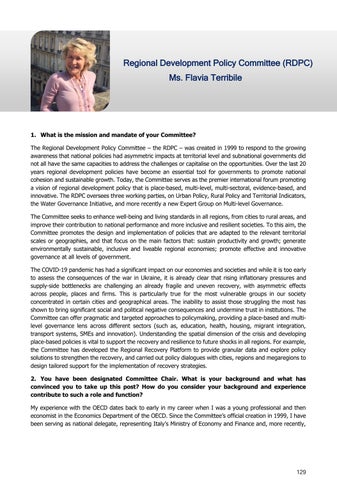Regional Development Policy Committee (RDPC) Ms. Flavia Terribile
1. What is the mission and mandate of your Committee? The Regional Development Policy Committee – the RDPC – was created in 1999 to respond to the growing awareness that national policies had asymmetric impacts at territorial level and subnational governments did not all have the same capacities to address the challenges or capitalise on the opportunities. Over the last 20 years regional development policies have become an essential tool for governments to promote national cohesion and sustainable growth. Today, the Committee serves as the premier international forum promoting a vision of regional development policy that is place-based, multi-level, multi-sectoral, evidence-based, and innovative. The RDPC oversees three working parties, on Urban Policy, Rural Policy and Territorial Indicators, the Water Governance Initiative, and more recently a new Expert Group on Multi-level Governance. The Committee seeks to enhance well-being and living standards in all regions, from cities to rural areas, and improve their contribution to national performance and more inclusive and resilient societies. To this aim, the Committee promotes the design and implementation of policies that are adapted to the relevant territorial scales or geographies, and that focus on the main factors that: sustain productivity and growth; generate environmentally sustainable, inclusive and liveable regional economies; promote effective and innovative governance at all levels of government. The COVID-19 pandemic has had a significant impact on our economies and societies and while it is too early to assess the consequences of the war in Ukraine, it is already clear that rising inflationary pressures and supply-side bottlenecks are challenging an already fragile and uneven recovery, with asymmetric effects across people, places and firms. This is particularly true for the most vulnerable groups in our society concentrated in certain cities and geographical areas. The inability to assist those struggling the most has shown to bring significant social and political negative consequences and undermine trust in institutions. The Committee can offer pragmatic and targeted approaches to policymaking, providing a place-based and multilevel governance lens across different sectors (such as, education, health, housing, migrant integration, transport systems, SMEs and innovation). Understanding the spatial dimension of the crisis and developing place-based policies is vital to support the recovery and resilience to future shocks in all regions. For example, the Committee has developed the Regional Recovery Platform to provide granular data and explore policy solutions to strengthen the recovery, and carried out policy dialogues with cities, regions and megaregions to design tailored support for the implementation of recovery strategies. 2. You have been designated Committee Chair. What is your background and what has convinced you to take up this post? How do you consider your background and experience contribute to such a role and function? My experience with the OECD dates back to early in my career when I was a young professional and then economist in the Economics Department of the OECD. Since the Committee’s official creation in 1999, I have been serving as national delegate, representing Italy’s Ministry of Economy and Finance and, more recently,
129
















